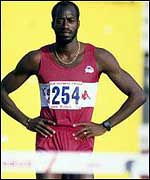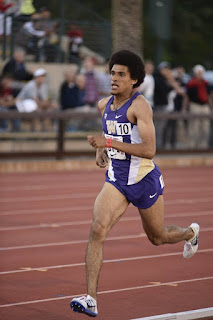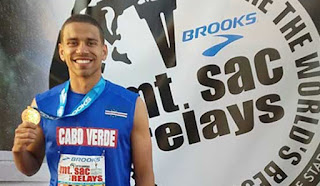Doping isn't the only way to the top for athletes

NOTE: This was passed along to paulmerca.blogspot.com by my good friend and TAFWA member Gary Dobbs, who is a friend of Edwin Moses. I've known Edwin since the early 1980's, when he was under contract to Kappa Sport, and I was a young buck out of college working as a consultant to Kappa doing sports marketing in the Pacific Northwest.
I'm honored to have Edwin write this piece for paulmerca.blogspot.com, in hopes that his message about the effects of doping is communicated to as many people as possible. Parts of this have been published in both the Times of London, and the Los Angeles Times.
Like the parabolic mirror that ignites the flame in Olympia every two years, the avenging spirit of sport recently has focused its heat upon yellow jerseys and ski boots. Now I want to add my own fire to the mix.
Since May 23: Doping confessions on the part of Danish cycling champion Bjarne Riis. Telenovela-like EPO-related arbitration hearings of American cyclist Floyd Landis. The $1-million fine issued by the International Olympic Committee upon the Austrian Olympic Committee for its role in the 2006 Turin blood-doping scandal. Lifetime Olympic bans placed on 14 Austrian ski team officials. Cross-country skiers from Kazakhstan and Russia banned for two years. Three German Olympic doctors with responsibilities to amateur skiing, cycling and Paralympic teams suspended for providing EPO to athletes under their care.
I could also mention last summer's saga wherein Marion Jones escaped with a negative B-sample and Justin Gatlin bit the dust. Or shall we go back to the 2004 World Track Championships, an annual meet from which other BALCO clients were subsequently banned?
The roster of doping-associated stakeholders across the globe — not only athletes but federations, training institutes, coaches, corporate sponsors and national Olympic bodies — is a shameful who's who in the world of sports.
At the same time, Victor "BALCO" Conte is again open (legitimately?) for business — trumpeting this month to the Times of London that parents of kids with dreams of elite-level performance should "steer [the kids] in other directions" if they don't want them to take drugs, simply because "at some point they'll get to the level where they are told they have no choice but to use them."
Pitifully, Conte's corrupt mentality is supported by entries on sports blogs, in which great performers of the past (myself included) are unjustifiably maligned by a skeptical generation of so-called fans ignorant of the plain feasibility and indisputable effectiveness of honest, hard-core training techniques.
With only 15 months to go before the Olympic torch comes to rest in Beijing, it's time for me and all other clean world-class athletes from every sport to speak loudly against the false claim that doping is simply "the way it is" and the only way to the top.
To reach the pinnacle of my event, the 400-meter hurdles — and to stay there without ceding victory, as I did, for nearly a decade — I did not need or want to use performance-enhancing drugs. Instead, I trained smart and hard to get to and stay at the top.
Over more than 10 years, I logged a minimum of 15,000 miles on the track, beaches and cross-country trails; followed a strict diet tailored to high performance and recovery (a regimen I follow to this day), and focused my complete attention on the task at hand, living and breathing the entire training process every single day.
I invented a training regimen that included stretching, flexibility development and dynamic exercise techniques. And I was willing to deal with — for seconds, minutes, hours, days, weeks, months, years — the intense and relentless discomfort that comes from training mercilessly, two or three times a day. Through sheer focus and willpower, I made sure that the harder and more painful it got, the faster I became.
By definition, the elite level of sport is not open to just anyone — only the very rare individual will succeed. But to suggest that drugs are a de facto key to world-class victories is a lie. I delivered 122 consecutive victories and four world records on the basis of sweat and refined skill, period.
The sleazy brawn of doping degrades the noble ideals of sport and its true heroes: dedication, integrity, self-sacrifice, honesty, fairness, courage — all working together to fuel the desire and ability to compete, excel and win.
Counsel to all would-be champions: in training for competition, there are no shortcuts. Anyone who tells you differently is selling pure compromise.
Since 2000, I've served as chairman of the Laureus World Sports Academy and the associated Laureus Sport for Good Foundation. The core work of the academy is to use sport as a tool for positive social change, with a focus on the needs of the most disenfranchised and vulnerable children.
The values of honest sportsmanship, a level playing field, clean competition and sheer passion for the game that Laureus represents, and that we hold up to these children and our own as flares of opportunity and hope, are the values that must propel me and others like me to speak out loudly against the systems and stakeholders that enable and sustain the crooked work of doping.
In 1984, I was honored to open the L.A. Games by bearing the Olympic torch into the Coliseum and leading the recitation of the Olympic Oath, "in the true spirit of sportsmanship, for the glory of sport and for the honor of our teams." If we now fail to take a stand for sport as we love it and once practiced it, our legacy will be scorched indeed.
--
Moses is a two-time Olympic gold medalist in the 400-meter hurdles. Parts of this letter were printed in the Times of London's May 21 edition.
Since May 23: Doping confessions on the part of Danish cycling champion Bjarne Riis. Telenovela-like EPO-related arbitration hearings of American cyclist Floyd Landis. The $1-million fine issued by the International Olympic Committee upon the Austrian Olympic Committee for its role in the 2006 Turin blood-doping scandal. Lifetime Olympic bans placed on 14 Austrian ski team officials. Cross-country skiers from Kazakhstan and Russia banned for two years. Three German Olympic doctors with responsibilities to amateur skiing, cycling and Paralympic teams suspended for providing EPO to athletes under their care.
I could also mention last summer's saga wherein Marion Jones escaped with a negative B-sample and Justin Gatlin bit the dust. Or shall we go back to the 2004 World Track Championships, an annual meet from which other BALCO clients were subsequently banned?
The roster of doping-associated stakeholders across the globe — not only athletes but federations, training institutes, coaches, corporate sponsors and national Olympic bodies — is a shameful who's who in the world of sports.
At the same time, Victor "BALCO" Conte is again open (legitimately?) for business — trumpeting this month to the Times of London that parents of kids with dreams of elite-level performance should "steer [the kids] in other directions" if they don't want them to take drugs, simply because "at some point they'll get to the level where they are told they have no choice but to use them."
Pitifully, Conte's corrupt mentality is supported by entries on sports blogs, in which great performers of the past (myself included) are unjustifiably maligned by a skeptical generation of so-called fans ignorant of the plain feasibility and indisputable effectiveness of honest, hard-core training techniques.
With only 15 months to go before the Olympic torch comes to rest in Beijing, it's time for me and all other clean world-class athletes from every sport to speak loudly against the false claim that doping is simply "the way it is" and the only way to the top.
To reach the pinnacle of my event, the 400-meter hurdles — and to stay there without ceding victory, as I did, for nearly a decade — I did not need or want to use performance-enhancing drugs. Instead, I trained smart and hard to get to and stay at the top.
Over more than 10 years, I logged a minimum of 15,000 miles on the track, beaches and cross-country trails; followed a strict diet tailored to high performance and recovery (a regimen I follow to this day), and focused my complete attention on the task at hand, living and breathing the entire training process every single day.
I invented a training regimen that included stretching, flexibility development and dynamic exercise techniques. And I was willing to deal with — for seconds, minutes, hours, days, weeks, months, years — the intense and relentless discomfort that comes from training mercilessly, two or three times a day. Through sheer focus and willpower, I made sure that the harder and more painful it got, the faster I became.
By definition, the elite level of sport is not open to just anyone — only the very rare individual will succeed. But to suggest that drugs are a de facto key to world-class victories is a lie. I delivered 122 consecutive victories and four world records on the basis of sweat and refined skill, period.
The sleazy brawn of doping degrades the noble ideals of sport and its true heroes: dedication, integrity, self-sacrifice, honesty, fairness, courage — all working together to fuel the desire and ability to compete, excel and win.
Counsel to all would-be champions: in training for competition, there are no shortcuts. Anyone who tells you differently is selling pure compromise.
Since 2000, I've served as chairman of the Laureus World Sports Academy and the associated Laureus Sport for Good Foundation. The core work of the academy is to use sport as a tool for positive social change, with a focus on the needs of the most disenfranchised and vulnerable children.
The values of honest sportsmanship, a level playing field, clean competition and sheer passion for the game that Laureus represents, and that we hold up to these children and our own as flares of opportunity and hope, are the values that must propel me and others like me to speak out loudly against the systems and stakeholders that enable and sustain the crooked work of doping.
In 1984, I was honored to open the L.A. Games by bearing the Olympic torch into the Coliseum and leading the recitation of the Olympic Oath, "in the true spirit of sportsmanship, for the glory of sport and for the honor of our teams." If we now fail to take a stand for sport as we love it and once practiced it, our legacy will be scorched indeed.
--
Moses is a two-time Olympic gold medalist in the 400-meter hurdles. Parts of this letter were printed in the Times of London's May 21 edition.


Comments